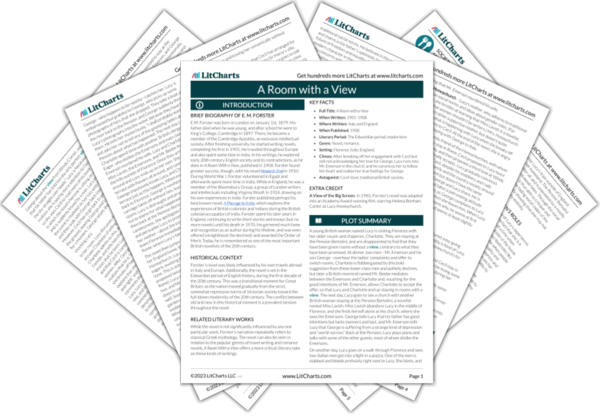In Florence, when Lucy is trying to explain her kiss with George to Charlotte, she tries as hard as she can to be absolutely honest about everything. And throughout the novel, Lucy insists to herself that she must not lie. But, over the course of A Room with a View, simple black-and-white distinctions between truths and lies start to blur. Often, Lucy does not quite lie, but leaves out the whole truth, omits certain things from stories, or doesn’t tell certain people certain things. She doesn’t tell Charlotte, for example, about George throwing her (blood-stained) pictures into the river in Florence, and later promises not to tell her mother about George kissing her. Later in the novel, she keeps her history with George a secret from her fiancé Cecil, as well as from her mother. Despite the importance Lucy places on absolute honesty, these kinds of half-lies can often be seen as justifiable—for example, they can be a necessary means to an end (Lucy doesn’t tell her mother about the kiss in order to protect Charlotte), or can be understood as in the best interest of those involved (Lucy doesn’t tell Cecil about George so as not to hurt him or make him unnecessarily jealous).
But while the novel reveals the ambiguities that almost always surround issues of lying and truthfulness, it also suggests that there is one kind of lie that no one can get a way with: lying to oneself. Lucy is greatly concerned with not lying to others, but for much of the novel she doesn’t realize that she is deceiving herself in pretending not to have feelings for George. She tries to suppress and stifle her love for him, and lies to herself about how much she loves Cecil—but in the end, her true feelings come out, and she is only able to find happiness when she embraces this truth and stops lying to herself about her own feelings. Thus, while one cannot always be absolutely honest in all facets of life (and perhaps would not necessarily want to be), Forster displays through the character of Lucy the ultimate importance of being honest at least to oneself.
Honesty ThemeTracker

Honesty Quotes in A Room with a View
I think he would not take advantage of your acceptance, nor expect you to show gratitude. He has the merit—if it is one—of saying exactly what he means. He has rooms he does not value, and he thinks you would value them. He no more thought of putting you under an obligation than he thought of being polite. It is so difficult—at least, I find it difficult—to understand people who speak the truth.
The scales fell from Lucy's eyes. How had she stood Cecil for a moment? He was absolutely intolerable, and the same evening she broke off her engagement.
But I cannot see why you didn't tell your friends about Cecil and be done with it. There all the time we had to sit fencing, and almost telling lies, and be seen through, too, I dare say, which is most unpleasant.
"I want more independence," said Lucy lamely; she knew that she wanted something, and independence is a useful cry; we can always say that we have not got it. She tried to remember her emotions in Florence: those had been sincere and passionate, and had suggested beauty rather than short skirts and latch-keys. But independence was certainly her cue.











